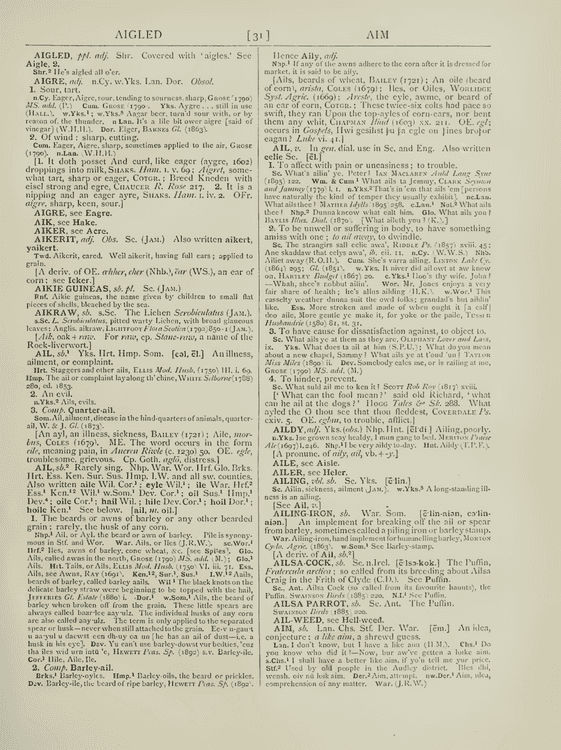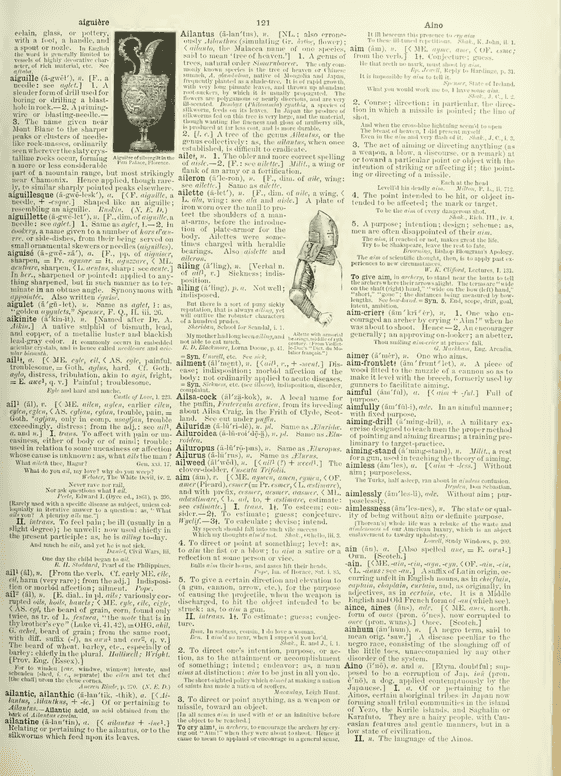Ail
Source : Wright, Joseph English Dialect Dictionary
AIL, sb.1 Yks. Hrt. Hmp. Som. [eəl, ēl.] 1. An illness,
ailment, or complaint.
Hrt. Staggers and other ails, Ellis Mod. Husb. (1750) III. i. 69.
Hmp. The ail or complaint layalong th' chine, White Selborne (1788)
280, ed. 1853.
2. An evil.
n.Yks.2 Ails, evils.
3. Comp. Quarter-ail.
Som. Ail, ailment, disease in the hind-quarters of animals, quarter-ail
ail, W. & J. Gl. (1873)
[An ayl, an illness, sickness, Bailey (1721); Aile, morbus,
Coles (1679). ME. The word occurs in the form
eile, meaning pain, in Ancren Riwle (c. 1230) 50. OE. egle,
troublesome, grievous. Cp. Goth. aglō, distress.]
---
AIL, sb.2 Rarely sing. Nhp. War. Wor. Hrf. Glo. Brks.
Hrt. Ess. Ken. Sur. Sus. Hmp. I.W. and all sw.Cy. counties.
Also written aile Wil. Cor.1; eyle Wil.1; ile War. Hrf.2
Ess.1 Ken.1 Ken.2 Wil.1 w.Som.1 Dev. Cor.1; oil Sus.1 Hmp.1
Dev.4; oile Cor.1; hail Wil.; hile Dev. Cor.1; hoil Dor.1;
hoile Ken.1 see below. [ail, m.Cy. oil.]
1. The beards or awns of barley or any other bearded
grain; rarely, the husk of any corn.
Nhp.1 Ail, or Ayl, the beard or awn of barley. Pile is synonymous
in Stf. and Wor. War. Ails, or Iles (J.R.W.). se.Wor.1
Hrf.2 lies, awns of barley, cone wheat, &c. [see Spiles]. Glo.
Ails, called awns in the north, Grose (1790) MS. add. (M.); Glo.1
Ails. Hrt. Tails, or Ails, Ellis Mod. Husb. (1750) VI. iii. 71. Ess.
Ails, see Awns, Ray (1691) Ken.1 Ken.2, Sur.1, Sus.1 I.W.1 I.W.2 Aails,
beards of barley, called barley aails. Wil.1 The black knots on the
delicate barley straw were beginning to be topped with the hail,
Jefferies Gt. Estate (1880) i. Dor.1 w.Som.1 Ails, the beard of
barley when broken off from the grain. These little spears are
always called baar·lee aay·ulz. The individual husks of any corn
are also called aay·ulz. The term is only applied to the separated
spear or husk ─ never when still attached to the grain. Ee-v u-gau·t
u aa·yul u daewst een dh-uy oa un [he has an ail of dust ─ i.e. a
husk in his eye]. Dev. Yu can't use barley-dowst vur bedties, 'cuz
tha iles wid urn intü 'e, Hewett Peas. Sp. (1892) s.v. Barley-ile.
Cor.1 Hile, Aile, Ile.
2. Comp. Barley-ail.
Brks.1 Barley-oyles. Hmp.1 Barley-oils, the beard or prickles.
Dev. Barley-ile, the beard of ripe barley, Hewett Peas. Sp. (1892)
Hence Aily, adj.
Nhp.1 If any of the awns adhere to the corn after it is dressed for
market, it is said to be aily.
[Ails, beards of wheat, Bailey (1721); An oile (beard
of corn), arista, Coles (1679); Iles, or Oiles, Worlidge
Syst. Agric. (1669); Areste, the eyle, awme, or beard of
an ear of corn, COTGR.; These twice-six colts had pace so
swift, they ran Upon the top-ayles of corn-ears, nor bent
them any whit, Chapman Iliad (1603) XX. 211. OE. egl;
occurs in Gospels, Hwi gesihst þu þa egle on þines broþor
eagan? Luke vi. 41.]
---
AIL, v. In gen. dial. use in Sc. and Eng. Also written
eelie Sc. [ēl.]
1. To affect with pain or uneasiness; to trouble.
Sc. What's ailin' ye, Peter? Ian Maclaren Auld Lang Syne
(1895) 122. Wm.&Cum.1 What ails ta Jemmy, Clark Seymon
and Jammy (1779) l. 1. n.Yks.2 That's in 'em that ails 'em [persons
have naturally the kind of temper they usually exhibit]. ne.Lan.
What ails thee? Mather Idylls (1895) 258. e.Lan.1 Not.2 What ails
thee? Nhp.2 Dunna kneow what ealt him. Glo. What ails you?
Baylis Illus. Dial. (1870) [What aileth you? (K.).]
2. To be unwell or suffering in body, to have something
amiss with one; to ail away, to dwindle.
Sc. The strangirs sall eelie awa', Riddle Ps. (1857) xviii. 45;
Ane skaddaw that eelys awa', RIDDLE Ps. cii. II. n.Cy. (W.W.S.) Nhb.
Ailiet away (R.O.H.). Cum. She's varra ailing, Linton Lake Cy.
(1864) 295; Gl. (1851) w.Yks. It niver did ail owt at aw know
on, Hartley Budget (1867) 20. e.Yks.1 Hoo's thy wife, John?
─ Whah, shee's nobbut ailin'. Wor. Mr. Jones enjoys a very
fair share of health; he's allus ailding (H.K.). w.Wor.1 This
casselty weather dunna suit the owd folks; grandad's but aildin'
like. Ess. More stroken and made of when ought it [a calf]
doo aile, More gentle ye make it, for yoke or the paile, Tusser
Husbandrie (1580) 81, st. 31.
3. To have cause for dissatisfaction against, to object to.
Sc. What ails ye at them as they are, Oliphant Lover and Lass
ix. Yks. What does ta ail at him (S.P.U.); What do you mean
about a new chapel, Sammy? What ails ye at t'oud 'un? Taylor
Miss Miles (1890) ii. Dev. Somebody eales me, or is railing at me,
Grose (1790) MS. add. (M.)
4. To hinder, prevent.
Sc. What suld ail me to ken it? Scott Rob Roy (1817) xviii.
[‘What can the fool mean?’ said old Richard, ‘what
can he ail at the dogs?’ Hogg Tales & Sk. 288. What
ayled the O thou see that thou fleddest, Coverdale Ps.
cxiv. 5. OE. eglan, to trouble, afflict.]
---
AIL, sb.2 Oxf. Bdf. Som. The beard or awn of barley,
or any other bearded grain. Gen. in pl. Oxf.1 MS. add.
Bdf. (J.W.B.)
Hence Aily-bearded, adj. applied to bearded wheat
or rivet(s (q.v.).
Som. A man told me he didn't think the birds would do his
little bit of ground much harm— he had sown it with that aily-wheat
(W.F.R.).
---
AIL, v. and sb.3 Sc. Lin. 1. v. To affect with pain or
uneasiness. n.Lin. (J.T.F.), se.Lin. (J.T.B.) 2. To have
cause for dissatisfaction against; to object to. n.Lin.
(J.T.F.) 3. sb. An illness, ailment. Gen. in pl.
Per. Nane kent the bairnies' frets and ails, Stewart Character
(1857) 5. Ayr. A small ail is a great evil to an old woman, Galt
Ann. Parish (1821) xviii.
---
AIL, see Heal, v.2
---

Source : Century Dictionary

The peasant speech of Devon. With other matters connected therewith
by Hewett, Sarah
Publication date 1892
Topics English language -- Dialects Devonshire
Publisher London : E. Stock